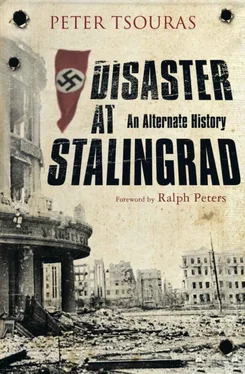The weight of woes was not all on the Soviet side of the scale. German resources were inadequate for the campaign that eventually unfolded. Hitler’s stated objectives for the 1942 summer offensive were to destroy the bulk of the remaining Soviet field armies east of the Don and to overrun the Caucasus and Transcaucasus regions of the Soviet Union to acquire the economic resources Germany lacked, primarily oil. These objectives were to be undertaken consecutively. However, when Hitler decided to accomplish them concurrently, he badly overstretched German resources in all categories, condemning his armies to be neither strong enough in the attack on Stalingrad nor in the lunge into the Caucasus.
Hitler further compounded these errors by becoming obsessed with taking the city of Stalingrad and condemned his 6th Army to be burned out in what was essentially Verdun on the Volga. Ironically the original planning did not emphasize any importance attached to the city itself other than as a location towards which 6th Army would be directed. The city fighting devoured men the way German mobile operations did not. The Germans called it the ‘Rats’ War’, Der Rattenkrieg, so vicious and remorseless it was. Homer, perhaps the most profound observer of men in war, captured the imagery and essence of that battle in lines written some 3,000 years before.
Both armies battled it out along the river banks —
They raked each other with hurtling bronze-tipped spears.
And Strife and Havoc plunged in the fight, and violent Death —
Now seizing a man alive with fresh wounds, now one unhurt,
Now hauling a dead man through the slaughter by the heels,
The cloak on her back stained red with human blood.
So they clashed and fought like living, breathing men
Grappling each other’s corpses, dragging off the dead. 4
Hitler again compounded the problems burdening his forces by his chronic inability to accumulate a reserve without immediately expending it. So, as 6th Army screamed for reinforcements, there were no available operational reserves on the Eastern Front. At the same time the Soviets were accumulating huge reserves. Herein is an insight into the nature of German and Soviet command. Hitler’s growing insistence that he make all important decisions, which rapidly devolved into reserving his permission to move even single divisions, hobbled his outstanding stable of generals. As Hitler curtailed the initiative allowed his generals, Stalin increased the command scope of his own team of talented officers. He also showed a much more balanced and shrewd strategic grasp, and listened to and often followed the advice of his leading commanders.
What masked Hitler’s imposed burdens on his forces were their outstanding combat capabilities. German training and tactical and operational expertise were clearly superior to those of the Soviets. Air-ground coordination was a particularly lethal tactical combination.
What resulted was that German resources dwindled as their forces continued to struggle beyond their culminating point. Soviet resources at the same time continued to grow, fed by a careful accumulation of reserves and the resources in material and supplies provided by their own relocated war industries and the arrival of increasingly large amounts of foreign aid, chiefly through the Arctic Convoys and through the Persian Corridor, with the transpacific route through Vladivostok beginning to come on line. Germany was inexorably losing the war of material. Ironically, it was not their inevitable defeat that strikes one but how close they actually came to winning, as Charles de Gaulle once observed.
In 1944, General Charles de Gaulle visited Stalingrad and walked past the still-uncleared wreckage. Later, at a reception in Moscow, a correspondent asked him his impressions of the scene. ‘Ah, Stalingrad, c’est tout de même un peuple formidable, un très grand peuple,’ the Free French leader said. The correspondent agreed. ‘Ah, oui, les Russes …’ De Gaulle interrupted impatiently, ‘Mais non, je ne parle pas des Russes; je parle des Allemands. Tout de même, avoir poussé jusque‘à lá.’ (‘That they should have come so far.’). 5
‘That they should have come so far’ offers a tantalizing hint at how close the issue actually was. What would it have taken, within the realm of rational options, for the game to have gone to the Germans is a question that always hangs in the air, with its answer just out of reach.
The decision nodes, where events hung in the balance, are like the railway switching yards of history. The smallest change can send a train laden with the might of armies in a totally different direction. The changes then start branching exponentially.
The great Theban general, Epaminondas called the great plain of Boeotia ‘the dancing floor of war’, a primal description of a blood-soaked ground that fully applied to that other blood-soaked ground between the Don and the Volga. The task of alternative history is to change the tune on that dancing floor, to see what unexpected fate the new beat and step will bring forth.
As we march down one of history’s roads not taken and into an alternative history of events, that history requires references in the form of endnotes to reflect its own literature — the memoirs, histories and other accounts that it would have generated. These have been added to the real references. The use of these alternative reality notes, of course, poses a risk to the unwary reader who may make strenuous efforts to acquire a new and fascinating source. To avoid frustrating, futile searches, the alternative notes are indicated with an asterisk (*) before the number.
CHAPTER 1
Führer Directive 41

The Wolfsschanze, Führer Headquarters, Rastenburg, East Prussia, 4 April 1942
As Hitler read through the Oberkommando der Wehrmacht (OKW — Headquarters of the Armed Forces) Operations Staff briefing for Operation Blau (Blue), the plan for the 1942 summer campaign, the angrier he got. The Wehrmacht’s Operations chief, Colonel General Alfred Jodl, had become attuned by now to Hitler’s body language and braced himself.
‘This is not what I want!’ Hitler said. He fumed at the plan and its General-Staff trained officers, so steeped in the traditions from Scharnhorst to Schlieffen, the very system that Hitler had concluded was manifestly inferior to the intuitive judgement of his genius. Behind that contempt was the rage that so many of these generals, as well as the senior commanders at the front, had obeyed his orders grudgingly and with the most obvious of reservations. ‘No! No! No! I will have no more of these vague, elastically framed tasks!’
By that he meant the mission orders on the Auftragstaktik principle that granted the commander in the field great leeway and initiative in exactly how he executed those orders. Freedom of action was the last thing he wanted to give Field Marshal Fedor von Bock, commander of Army Group South. The last time he had done that for his senior officers was in Operation Barbarossa, the invasion of the Soviet Union the previous June. And what had they done with that freedom of action? They had failed to take Leningrad and Moscow and were stunned by the Russians’ winter counteroffensive. Their precious General Staff methods failed them when the Russians came howling through the snow to throw them back in panic, that brother to blood-stained rout. The whole army would have come apart at the seams if he, Adolf Hitler, who had held no more than a corporal’s rank in the Great War, had not issued his stand fast and fight it out order. He had saved the army through this act of sheer will.
Читать дальше













